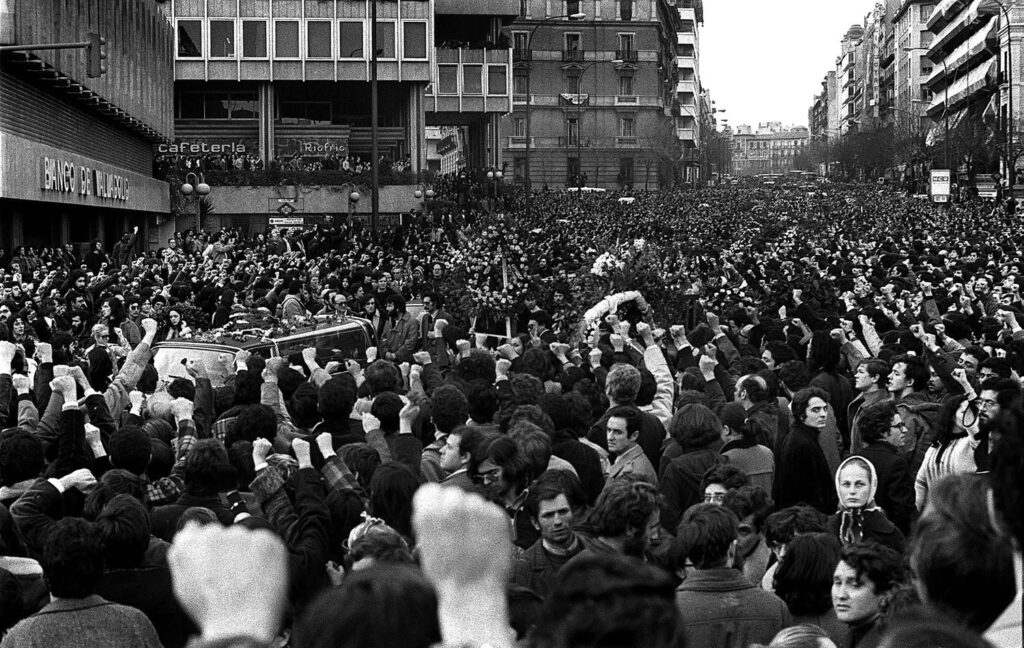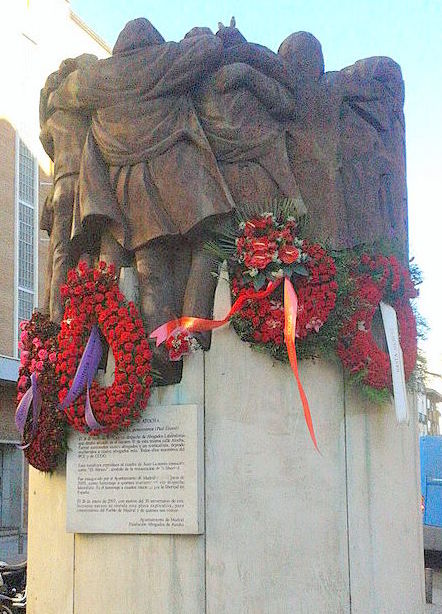Unbelievably it is 3 years ago that we were able to get an apartment in Madrid. Three whole years. I was looking at the picture that is on my FaceBook page (the page I ‘never’ look at) and here follows a little explanation (Plaza San Martin). Since 2012 we have always stayed (AirBnB) on that side of Madrid, nearly always in the ‘Lavapies’ barrio, at the bottom of the hill it (literally) means the place of washing feet. It has always been a place that has drawn the immigrants (seems appropriate as that is who we are to Madrid and to Spain), a challenging place where drugs are easily available, the drugs scene run in the main by Chinese mafia with foot soldiers often drawn from the African community. Since 2012 until 2018 we have (all-but) prayer walked every street of the barrio. Gentrification is setting in – the good side it can ‘lift’ a community, the down side of course is that people are squeezed out. We have tried to use the apartment as gift when we are not there, and I am always amazed at how within our hands there will always be something we can do that is small but sows into a future. The ultimate small is the ‘container’ for glory in the Bethlehem context that we mark at this time of year.
Land is interesting. It is the container for the corporate memory, hence can resist renewal or can be very open. Lavapies… a great history.

Quite a crowd, with the photograph taken in 1977 and of a funeral cortege in our area. In January, seemingly in order to provoke a reaction so that the military would have to step in and reverse the democratic process post-Franco, three gunmen entered a lawyers’ office and killed five of those present. However, it appears that the desired result did not take place. On the day of the funeral the response called for from those who identified with the victims was one of responding in silence and not to participate in any violence. As can be seen a crowd of some 100,000 gathered, without any physical retaliation. It is said that rather than reverse the democratic process it was a major catalyst in moving it forward.

Right in the centre of the area (Anton Martin) is this memorial to that event. The ‘hug’ says it all, and at the top of the plaque is a quote:
If the echo of their voice weakens, we will perish.
This is our area, and each time we walk past that memorial it is indeed a memory provoker. Beyond our memory that land has a record of it.
(Image by Tulimori – Own work, CC BY-SA 4.0, https://commons.wikimedia.org/w/index.php?curid=34138915)
How many places are there that we can stand on the shoulders of those who have gone before, those who had faith and those who did not, but they knew somehow that their responses were sowing for a future. Add to that a true apostolic vision, marked by long term patience aligned to consistent direction, and I am sure there are many geographic situations that are waiting for us nobodies to connect with.


As I keep telling my colleagues, there is no better time to be a Landscape Architect. I consider it a privilege to support and encourage their approach to connecting people in all walks of life with the landscape, through beautiful and sensitive designs, that respects cultures and traditions but also try to move it forward.
Hi Joanna so right. If we could only see work connected to creation – as in what we call creation and what we have done with it, and what we have done within it – we would be moving in the right direction (and add ‘new creation’). And a disconnection from ‘money’ but a connection to economy. Gotta dream and gotta sow at each opportunity.
Hey Joanna, I’m with you. I have steered several architecture students to landscape on the basis on future employment alone. There will be jobs there. Climate resilience is based on land and landscape management.
I’ve been reflecting on the post prior to this – what to look forward to in 2022 and on this. They are definitely linked. 2022. . . all the fatigue, longing and hopes for a world restored to a balance or at least what we thought was balanced. But of course, it was way out of balance. Nostalgia, longing for ‘home’ is something we must all resist. Instead, the land we must invest in will feel and look like a wilderness to us, not home at all. It might feel barren. We may not feel resourced sufficiently. But that wilderness is the place to plant roots, green it up, restore, regenerate and make new. We humans have put an awful lot of effort into destruction of the land. We have ripped apart, plowed it up, left it sterile and unable to produce much of anything. It is time, past time, to change our approach to the land. The land remembers how to be productive. It knows how to restore itself if we allow it.
I listened to a video the other day about the town of Lytton, BC which burned this past summer after record high heat. A First Nations leader told the audience, that to destroy the land is to destroy ourselves. That is what we have done. And now, with a reset, a new balance is available to us, we can restore the land and in the process regenerate life in ourselves. Time to garden.
Have you come across the term solastalgia? Grief caused by environmental change in the place we live. A time to weep and let it go and sow into the next season.
Hi Joanna:
I haven’t come across ‘solastalgia’. New word to me. However, I know the grief personally and among my students. For years I have felt so strongly the need just to apologize to the earth, the land and other species. I grieve what we have done to them. It started about 30 years ago. I would stand in a worship session with ecstatic people all round and simply want to kneel and weep. I couldn’t figure it out. Felt really out of step. It got worse. I, who had always been a singer, lost my voice. I could not sing. At all. At times I went almost mute, couldn’t talk. What was happening? In time, I left the church as I could not stay within an organization that claimed to love children and at the same time mostly impeded efforts to address environmental loss from biodiversity to climate change. It seemed too immoral to be there. And in time, I realized it was about my connection to trees, land, other species, plants. Without that connection, as I was living in the city, I felt unmoored. Like a ‘rolling head’ which is how some First Nations refer to us settlers here in Canada. Gardening helps. Regenerative gardening.
I’ve seen it in my students though they do not know what they are losing yet most of the time. There is an underlying grief in many of them even as they are hopeful (mostly) for the future.
All ecosystems are in flux. They are all flipping to something new and will do so over the next few decades. The discussion of planting with native plants has little meaning anymore though I was trained in it and preference it in planting. We don’t know what will be ‘native’ in 20 years. It is disconcerting. Dizzying. In essence we must work with these flipping ecosystems and determine how they will go. What trees will survive? What plants will work best? How can we provide for species already there (native plants that can survive new climate regimes?) and for those that will inevitably come in? We must not let our grief trap us in nostalgia, a longing for home, as the old home no longer exists. It is this profound change that I find difficult to communicate to students. They simply cannot imagine the level of transformation that is here and is coming. We should grieve it as hopefully that motivates us to get to work on sustaining life in the midst of the chaos.
Indeed we need to grieve and that’s the point of solastalgia, it gives it a name, something tangible to let go of. Rennie Lertzman also has some interesting things to say about environmental melancholia and how it locks us into inactivity and understanding that helps us to break free of those ties and helps us move forward into an uncertain future.
I am encouraged though to finally see some movement in streams I was associated with. Just so late in the day! Thank God for grace and mercy as we are going to need that in bucketloads.